Sharing my blog stats is pretty nerve-wracking; I feel like I’m baring a piece of my soul for the universe to see, and I have no clue what people will make of it. How nerve-wracking, you ask? The urge to delete this for the past four months, fretting about in Clo’s DMs (I do this regularly anyway), plenty of imposter syndrome.
While I feel we should be more transparent about stats, we don’t talk about statistics either; it’s a bit of a taboo topic in the community. And maybe validly so: I don’t want to feel like I’m bragging and numbers shouldn’t be a validation of our hard work, not for something that’s a hobby for most of us. Except it’s kind of ingrained: many aspects of society depend on a hard numbers game to show success and productivity. (What’s your engagement rate? How many followers do you have? What’s your average monthly page views?)
But I’m nosy about my stats (and I’m sure you’re nosy as well if you’re reading this post). They’re fascinating, especially when something unusual happens that skews the entire data, and you want to scratch your head figuring out why something happened the way it did.
So I’m here today to share my blogging statistics of last year, to (hopefully) normalize sharing them. I’ll be pulling some average numbers from Pages Unbound’s Book Blogger Stats survey they began in 2016 (spoiler: I’m quite average) and also compare some numbers from the years I’ve been on WordPress. Plus, I’ll share some insights on why I think something might have happened or why a post did as well as it did.
NOTE: I might have a degree in Communications, learned a thing or two about SEO from blogging over the past decade, and even have an SEO Fundamentals Certification from SEMRush, but I am not an expert. And I should renew my certification, but we’ll ignore that part.
Some Things to Keep in Mind
AKA things that likely skewed my stats.
- This blog has been around for over a decade and moved from Blogger to self-hosted WordPress in February 2018.
- I deleted a huge chunk of posts posted between 2012 – 2018 because of the work to go through and revamp, and it was easier to get rid of most instead of keeping them.
- I had a snafu with Jetpack in 2022 while testing, which messed things up a little since likes don’t transfer (oopsies), but there’s still insight to glean from everything else!
- I occasionally write movie/TV show reviews, along with other posts. Book-related posts, however, make up most of my content.
- Since many use Jetpack or free WordPress, I used WordPress analytics for this rather than Google Analytics, which measures statistics differently (and has my stats from before the move).
With all of that said, let’s jump in!

Blog Followers and Average Page Views
In the 2022 Book Blogger Stats Survey conducted by Pages Unbound (referred to as “the survey” later on), Briana found “about 50% of bloggers answered either 0-25 or 26-50” and that “high followers don’t necessarily correlate with high traffic or lots of comments.”
This correlates with my statistics, as I currently have 281 WordPress followers. This has been relatively stagnant since around 2019-2020, when I had maybe 250 followers, if I recall. Not much growth there if I want to be hard on myself.
My page views have historically fallen between around 15-25 page views a day, although since September 2022 this has jumped up to 40-80 views a day. My best years (numbers-wise) seem to be in 2018 and 2019, before dropping and then substantially picking up in 2022.

Outlier Posts
There are two outlier posts, and they’ll be mentioned often throughout this post (because yes, they play a huge role):
- My review for the 2018 reboot of Meteor Garden, like many of my reviews, died a tragic death roughly two months after the post first went live. However, in October 2020, roughly six months later, the post had a sudden burst of life and has since been consistent.
- My review for Love Between Fairy and Devil did not, however, die a tragic death, nor did I expect it to because the drama was experiencing a lot of success. The show was also being uploaded to Netflix when my post went live near the end of September, so many people would be looking for reviews and insights. So compared to most posts, it actually went flying straight out the blogging gates. Within a week, it bowled over nearly every other stat and knocked out Meteor Garden as the top post of all time in roughly 1.5 months.
- If you’re concluding that this post is why my stats started picking up in September 2022, you would be correct.
- I’m a bit entertained by how this post is doing because I practically laughed in “WTF did I unleash on myself” in Clo’s DMs for a week straight.
Meteor Garden is based on the manga Hana Yori Dango while Love Between Fairy and Devil is based on the Chinese Novel Cāng Lán Jué (苍兰诀), so they’re not too far off from my usual book-related posts given that they’re adaptations.
Did I write the posts because they were successful so that it could boost my stats? No. I enjoyed writing both, though I wrote the second to see how it would affect my stats in the long term based on the first. I think I’d be less amused and more stressed if I wrote posts for the stats, and that’s not why I blog.
Some Insights and Commentary
I took part in more linkups like The Sunday Post and Top Ten Tuesday in 2018 – 2019, which brought in more views and comments. I was also a host for Blogoween and Bookend Events, and I used my blog for a class project in the Autumn 2019 (so there were more posts). All of this could be why I experienced more views.

I took part in fewer linkups beginning in 2020, which was the start of the pandemic, and lockdowns were in full effect. Blogs are long-form content; with most people’s mental health not the greatest during lockdown, consuming long-form content isn’t exactly enticing. As things opened back up again, things actually went back to normal and, in fact, became relatively steady.
This might be why we saw BookTok (and Instagram Reels?) gaining a lot of success and books achieving success when promoted on those platforms, though there has also been the push toward short-form video content even before the pandemic.
On the other hand, some blogs might have experienced higher views during the lockdown because people have more time to read longer content, and stats go down once things start opening back up. From talking with a few friends, I seem to be the special cheesecake here, or maybe I deleted so many old posts compared to the content I’m writing, it hurt my views, and 2022 was when I bounced back up because I’m no longer deleting those posts. Additionally, since I’ve definitely grown as a blogger over the years, the quality of my posts has changed/increased.
Another thing I’ve noticed is I often forget to follow blogs, even if I visit regularly. I know, I’m a terrible person, I’m so sorry! (Six months later I realize, hey, have I followed you? I think I did. Fool’s me, I did not.) But I do wonder if this plays a role in the correlation between views and followers. Most people have a social media account and don’t have a WordPress account, and most are selective about sharing their personal email addresses. My email subscribers are the lowest (but I also send nothing else aside from my posts).
It’s easier to type a URL or search for a blog name, and it’s easier to search for a post by that blog versus a social media post because most blogs have a search function available (if you don’t, I highly recommend it). And it’s not like I lock my posts to email only or have additional email content. So following might not be as big of a deal to some if they’re bookmarking their favorite sites and checking up regularly for new posts.
(It is, however, nice to support your favorite bloggers by following them right at the source, though.)
You could say it’s also convenient to be on a social media platform with one tab vs. 20 tabs of different blogs. If Amazon Prime has taught us anything, we like fast and convenient, and that’s exactly what social media is designed for.
Number of Posts/Consistency
We’ve all heard it: being consistent is key. I originally didn’t include this information, but after talking with some friends about statistics, I decided to go down a rabbit hole and create a spreadsheet to see if posting consistency might have affected my views. Spoiler: It did not. Not really.
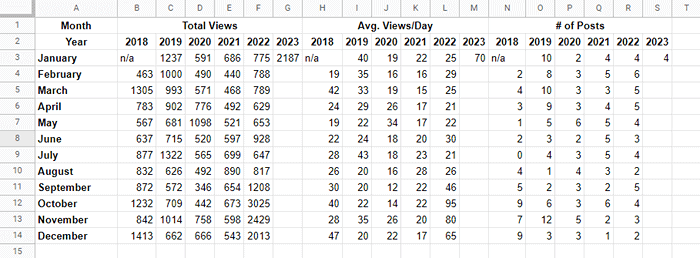
I was all over the place in 2018-2019 since my goal was to post twice a week. I’m still inconsistent from 2020-2022, but it’s less jumping from 12 posts to 3 because I settled with once a week (alternating Tuesdays and Fridays usually) working best for me.
Additionally, I deleted a huge chunk of posts from 2012-2018 around 2020-2021 and finished in 2022. No one enjoys getting a 404 error (neither do search engines), and I had a lot of those, so this could be why I had the exact opposite effect during the lockdown, where my views plummeted a bit. As I wrote more content and in a more consistent manner (and didn’t delete as much), things probably steadied out.
TL;DR, while consistency is nice to have, if you’re worried about posting daily or twice a week and need to change your posting schedule later on to better fit your life and your schedule, don’t beat yourself up over it. I can’t tell you how many times I’ve seen bloggers fretting over what to post and saying, “But I have to post because XYZ.” It is okay to skip a post or two.
Comments and Engagement
In the survey, Briana found that “nearly everyone answered they get 0-5 comments per day, regardless of how many followers they have or how many page views they get.”
Let’s look at the average comments and likes over the years! Or I guess lack of likes because of my oopsies. This is why I can’t have nice things.

Like my page views, I have average engagement, and we can notice that it’s fallen over the years even if we remove 2019 (which has more posts) from comparison. From the sounds of it, it’s not just my blog: there seems to be less engagement in the book blogging community overall.
Some Insights and Commentary
I’m not very social; I’m more consistent with posting content than I am with replying to comments and blog hopping. In a small niche like book blogging, when most of our audience is other bloggers, it might feel like not engaging is a death sentence. The only time I’ve gotten comments from non-bloggers were for Meteor Garden and Love Between Fairy and Devil (and a few trolls, once in a blue moon).
While I’ve become more social over the years, I have never been social overall. I don’t know if this is because I’m naturally reserved except for those I’m close with, witnessing others have negative experiences, or just not having enough energy and time. Perhaps a combo of all three, but I try to make an effort to reply within two months and at least visit/like because I enjoy supporting other bloggers. (Lately, I’ve been terrible at this for personal reasons.)
Additionally, I’m not as active on social media in recent years, mostly because it’s better for my mental health. I’m terrible at promoting my content, so it feels like I should have lower stats since a huge emphasis seems to be put on social media and promoting.
If I promoted my posts and put more effort into social media, I might receive more views. If I commented and engaged more with others, I might receive more comments and engagement and, therefore, more views or possibly more followers.
But every blogger is different in what they consider successful. Not everyone has the time to put in all the effort, and that is perfectly valid. While I would like to have more engagement, I’m also not too bothered because I don’t think I could keep up.
Traffic Sources
Approximately 37.5% of respondents in the survey stated most of their traffic comes from search engines, 33% from the WordPress Reader, and 18.2% from social media.
According to Google Search Console Insights, 79% of my traffic comes from search engine hits from the past 28 days. 18% are direct hits and 2% are from socials. This is, of course, largely affected by my review of Love Between Fairy and Devil. I’m usually around 45-60% prior to that post going up.
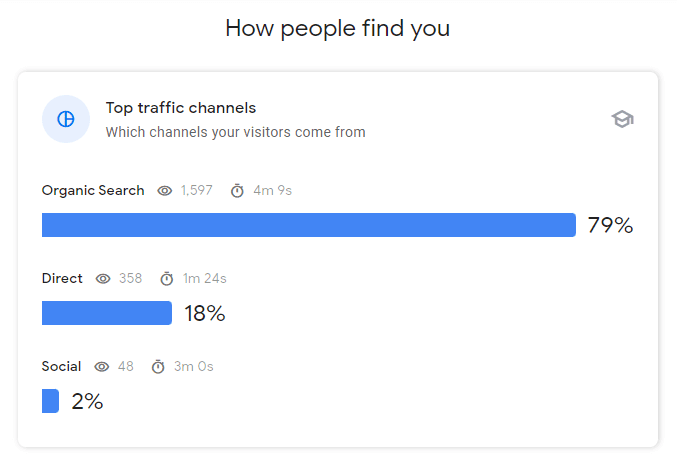
Overall, much of my traffic comes from search engines, followed by the WordPress Reader and Twitter. I also get quite a bit of traffic from linkups like the Sunday Post and Top Ten Tuesdays, but I no longer take part in the former after switching to monthly wrap-ups. The latter depends on the topic, and how I can make it uniquely mine beyond a simple list (if that is your jam, that is okay — there is nothing wrong with just posting a list and a sentence or two or nothing at all).
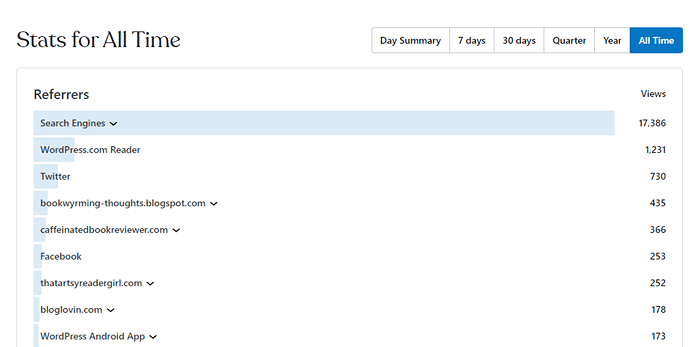
I find it strange the WordPress Android App is considered a separate traffic source, though. There’s not a separate one listed for iOS.
Some Insights and Commentary (ft. Mini Case Studies)
Do bloggers actually need social media to be successful (at least in terms of numbers)? While I think social media is a powerful tool that can be utilized, there are other factors that play a part as well. At the end of the day, you have to do what works best for you. If that’s Pinterest, focus your efforts on that. If that’s SEO, focus your efforts on that. If you just care about the content you put out, that’s also okay. Based on my personal stats, I don’t need social media to be successful. Much of my blogging effort actually goes toward my content and basic SEO, because that’s all the energy I really have.
I personally believe that reviews, including book reviews, are evergreen content because a good portion of my search terms are looking for reviews, analysis, explanations of endings, etc. Most of them do not pull up posts like weekly and monthly wrap-ups, and I thought it would be interesting to take a closer look at a few posts since they make up a lot of my traffic!
Insights from Love Between Fairy and Devil and Meteor Garden
You could say that despite these two being outliers, they’re my most successful. (After all, they’re currently my top posts of all time.) Here’s why I think Love Between Fairy and Devil did so well out of the gate:
- The drama aired from August 7 – August 29, 2022 on iQIYI, with special content airing between September 12 – 16.
- It started airing on Netflix US beginning September 9, 2022 (US is my biggest audience).
- It became one of the most popular Chinese dramas of the year when it began airing, and its popularity continued after the final episode broadcasted.
- There weren’t many reviews out there already (this has likely since changed).
Not only was it a review, but it was also timely, and I just rolled myself into a spot casually and parked. It’s too early to tell how this will do long-term (though, it’s going steady months later), so let’s look at Meteor Garden, which has three years of data and was posted two years after the drama aired, so it wasn’t as timely.
- The drama was also one of the most popular Chinese dramas when it aired in 2018, mostly because Meteor Garden (or one of the many versions) was many people’s first introduction to Asian dramas (including mine!). It was definitely nostalgic and introduced the story to a new audience. (Plus, it catapulted some new careers in a good way. We love to see it.)
- The ending was confusing. I, too, was confused, and everyone was pretty Big Mad.
- There weren’t many reviews out there already, and even fewer talked about the ending.
This actually died before coming back to life and staying alive (so you never know when a post will suddenly get hits months or years later). Based on the screenshot below of overall monthly stats since it was posted, you can see it jumps up and down over the years but is steady.
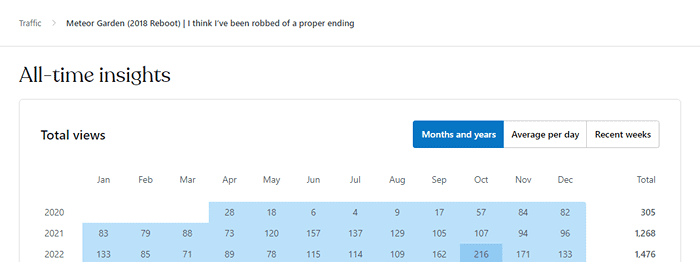
It jumps slightly in June 2022, but especially in September and October. I think this is likely because Dylan Wang (Wang Hedi) is the lead actor for both dramas, and I have both reviews linked to each other. June is likely when heavy marketing began for Dylan’s drama (though some form would begin earlier with teasers, casting announcements, etc.), so people might be curious about his past works, along with the leading actress, Yu Shuxin (Esther Yu).
Insights from Book Reviews vs. Wrap-Ups
“But Sophia,” you say, “Those are drama reviews. What about book reviews?”
Let’s take my review of The Shadow Glass by Rin Chupeco, which is my most-viewed book review, and third most-viewed overall.

I genuinely have no clue why this review did as well as it did outside of being part of the blog tour and posting shortly after the release, but I imagine it may have something to do with others reading Chupeco’s works and then coming back to their previous novels. If you like an author’s work, you’ll likely look for past works, and you might look for reviews too.
It may also be because it’s the last novel in a series (people really like to search for endings…), as Send Me Their Souls is another post that has seen similar success. However, my next top review is Six Crimson Cranes, the first in a duology. With the release of its sequel, The Dragon’s Promise, in August, it has a slight uptick in views, likely because people may reread the first novel, need a bit of a refresher, or are curious about the first.
Stand-alone novels can also do well, though why my review for Pretend She’s Here did well will remain a mystery.
If we grab the stats from one of my old wrap-ups and see how it’s done over the years, you’ll notice it dies a much tragic death. While they sometimes get traffic later, 95% of the time, they stay dead after the first two months. They’re really just there for memory’s sake (and for anyone who is curious about my life over the years, but I’m pretty boring).
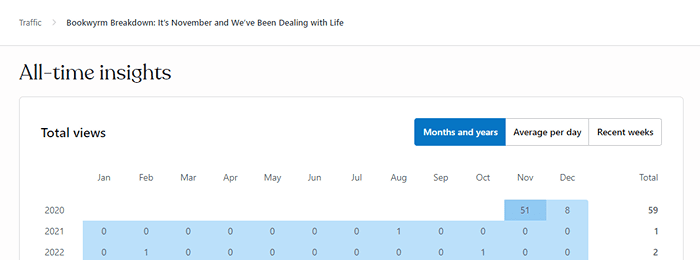
SEO works in the most mysterious ways sometimes, but what we can take away from this is reviews will always have the potential for traffic long term. (One of mine died for about four years before coming alive again.)
I think we sometimes get caught up in how well a post does when it goes live that we often overlook the power reviews actually have in the long run. We’re more caught up in the instant gratification (likes, retweets, etc.) that comes with it. It’s easy to get discouraged when you see a post do a giant belly flop. And that’s not really the entire point of blogging, either. Like I mentioned earlier, blogging is more about the long game rather than instantaneous, but I think it’s important to enjoy yourself as well, especially if you’re not making a living out of it.
Insights from Looking at the Top 20 Posts
If we ignore my two little outliers and non-book reviews and look at the rest of my Top 20 posts, nine posts are book reviews. That’s roughly 45% of my top posts. If we include my non-book reviews (but still reviews), 14 posts are reviews and 70% of my top posts are bringing me the most traffic. That’s a lot of reviews.

There are, of course, a few things affecting this:
- Most of my posts are reviews, so it makes sense that reviews would likely be my top posts. (Although, in 2018, my top posts were not reviews because I didn’t review as much. I did a lot more discussion and fun posts that year.)
- I haven’t tried lists and recommendation posts (outside of TBR lists), which might affect stats as well. The thought of doing them is a little daunting and doesn’t bring me as much joy, though, so I choose not to do them.
- While I started out posting daily (and even twice a day), I now post weekly. Sometimes I only post once or twice a month. We often get told we need to post often, daily if we can, to see any form of numerical success or receive higher views in a day. On days a post goes live, some people might see a higher number of views, and on days there are no posts, some people might see no views.
Is it possible that my daily posting in the past could’ve affected my current stats and why I’m still average instead of tanking because there are folks who continue to read my blog over the years? Possibly. Is it possible that I could’ve keyworded my reviews right (and naturally) with the help of an SEO plugin? Also possible. Or am I majestic unicorn with a magnetic aura and I’m not aware of this? I cannot confirm this one.
Based on earlier stats shared, mine is usually steady regardless of whether or not I post, though this may sometimes affect daily views a little, depending on the type of post. As fascinated as I am with daily data, I don’t like to look at them too often unless something Very Interesting™ is happening (then I’m all over it like a little goblin for a while before ignoring again).
I think the pivot to more reviews than discussion and fun posts is also partially why I have had less engagement in later years; it’s a lot easier to comment on wrap-ups, lists, discussions, and fun posts than it is to comment on reviews. What do you really say beyond “Great review” when you haven’t read the book yourself?
Anyways, I’m going to keep dying on the hill that reviews are evergreen. This is not me telling you to write more book reviews and write less fun content like tags and weekly memes or that you should choose another niche and abandon book blogging completely. You should post whatever makes you happy and whatever you have the energy for; if that means book reviews primarily, that’s completely okay.
Final Thoughts/Key Takeaways
I think my brain exploded while writing this post. I mean, this is a lot of words (help – 4k?!) but also lots of numbers, and it exposed me.
- We could use some more stats transparency in the community, so they’re more normalized.
- What works for me might not work for you.
- More Followers ≠ More Traffic or Engagement.
- A variety of factors affect overall stats.
- Reviews, including book reviews, are evergreen and have the potential for traffic even if they die a tragic death.
I started out this post mostly wanting to look at my 2022 stats, intending to do it annually, but then it morphed into the last nearly five years on self-hosted, comparisons and mini case-studies/insights. So maybe we’ll do this for 2023’s or 2024’s stats (let me know what you’re curious to see)? Assuming I’m still around in the blogging world? We shall see. But I hope this (very long) post was helpful and gave some transparency with my blogging stats (and perhaps even be reassuring).

Sophia started blogging in February 2012 for the hell of it and is surprisingly still around. She has a GIF for nearly everything, probably listens to too much K-Pop and is generally in an existential crisis of sorts (she's trying her best). More of her bookish reviews and K-Pop Roundups can be found at The Arts STL.
If you enjoy her posts or found them helpful, consider tipping on KoFi!

yay you finally posted it! (now i should get up and write mine too….)
firstly, thanks for alllll the info and screenshots. i’m very nosy and i am grateful for this info. you’re right, we talk about sharing stats but we actually do it fully.
the fact that consistency made zero impact on your engagement is interesting, maybe its because most (or half) of your traffic is from search engines which don’t see each and every post and don’t account for consistency?
i fully agree about the following through social media bit. i also believe that once people are used to following through wp, subscribing through email isn’t attractive. and it’s not convenient like a feed. i personally use Feedly to keep up with blogs and am aware that me following through that doesn’t get accounted for. but i use it because not all self-hosted blogs use jetpack for me to use wp and emails aren’t convenient.
thanks for all the insights and commentary on your posts and statistics! i def need to check whether consistency affected my engagement before writing my post.
“maybe its because most (or half) of your traffic is from search engines which don’t see each and every post and don’t account for consistency?” That is SUPER possible, along with the fact most people on search engines are generally just searching for information or reading more and then leaving the site (some will leave a comment, but the vast majority don’t).
Given we’re past the halfway point in 2023 though, I think that’s definitely accurate especially since I’ve been sparsely posting (and while my stats have very slowly declined with the lack of content, it’s still on average about the same). It’ll be fun to look at once 2024 rolls around though!
“While I would like to have more engagement, I’m also not too bothered because I don’t think I could keep up.”
My thoughts exactly!
It’s interesting that you managed to debunk the myth of consistency=key to blogging success. Also, yes, reviews are evergreen, and we shouldn’t feel like certain posts (like the review themselves) tanked only because they don’t get (many) comments…it’s nice to see that your analysis supports that.